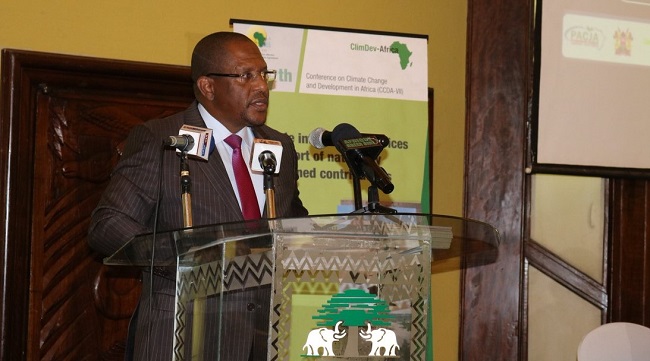The Seventh Conference on Climate Change and Development in Africa (CCDA-VII) opened on Wednesday, October 10, 2018 in Nairobi, Kenya with a strong call for Africa to prepare and speak with one voice when it goes to the next UN climate change talks (COP 24) holding in Katowice, Poland in December.

Kenya’s Environment and Forestry Minister, Keriako Tobiko, speaking on behalf of President Uhuru Kenyatta, said climate change was a matter of life and death for Africa, hence the need for its leaders to speak with a strong unified voice and be heard when participating in multilateral climate negotiations and other global issues.
“We have all experienced the devastating and unprecedented impacts of climate change on our peoples’ lives and livelihoods as well as our national economies. Africa is the most vulnerable continent despite contributing only about 4% to global greenhouse gas emissions but when we go to argue our case we speak in tongues and come back with no deal,” he said.
“We need to make sure that we have a unified voice as we proceed to COP24. We should showcase our own solutions to climate change; solutions that are developed and customised to fit our own situation.”
He said that, given Africa’s shared ecosystems and the fact that natural resources know no boundaries, it was essential that “we continue to speak in one voice to safeguard the basis of our development and seek transformative solutions”.
Commenting on the Intergovernmental Panel on Climate Change’s (IPCC) “Global Warming of 1.5oC special report and its impacts in the context of strengthening the global response to the threat of climate change, sustainable development, and efforts to eradicate poverty”, Mr. Tobiko said limiting global warming to 1.5oC would require rapid, far reaching and unprecedented changes in all aspects of society.
“Operationalisation implies that adequate and predictable resources be mobilised and made available to support adaptation and mitigation action in Africa and other developing world,” he said, adding that it was important that discussions and outcome of CCDA-VII contribute to building momentum towards the upcoming COP24 and implementation of Nationally Determined Contributions (NDCs).
All is not Doom and Gloom
As captured in the IPCC special report on the impacts of global warming of 1.50C, James Murombedzi of the African Climate Policy Centre (ACPC) emphasised that climate change poses undoubtedly the greatest risk to the realisation of the ideals of the AU’s Agenda 2063 and the UN’s Sustainable Development Goals (SDGs).
But the report concluded that “anthropogenic emissions up to the present are unlikely to cause further warming of more than 0.5°C over the next two to three decades (high confidence) or on a century time scale (medium confidence)”.
Murombedzi therefore believes that not all is doom and gloom as “there is a chance for a stable climate system which will allow for sustainable development but only if we do manage to halt emissions in the projected time frame”.
He said there are opportunities to be harnessed by halting emissions and to have an organised transition to a carbon neutral future in the shortest time possible; and restructuring local economies to ensure sustainable development without further emissions.
Tobiko also believes yhat climate change threats present opportunities for innovative and green investments for Africa.
“This is why implementation of the Paris Agreement remains a priority for the continent to adapt to the inevitability of climate variability and change. It is however important to emphasise that achieving the goals of the Agreement require committed leadership from state and non-state actors,” he said.
Local communities, women and the youth, he said, should be engaged in Africa’s efforts to combat the vagaries of climate change.
CCDA-IV Call for Climate Action
The theme for this year’s CCDA forum is “Policies and actions for effective implementation of the Paris Agreement for resilient economies in Africa”, chosen to reflect Africa’s collective engagement and commitment to strengthen climate change actions in the context of its development priorities.
The CCDA is an initiative of the ClimDev-Africa Initiative, a tripartite programme of the African Union Commission (AUC), the African Development Bank (AfDB) and the UN Economic Commission for Africa (ECA).
It was conceived as a physical dialogue place to promote interaction between science and policy on issue related to the climate change-development nexus.
This year’s meeting has attracted over 700 participants from member states, climate researchers, academia, civil society organisations, private sector, youth, women and local government leaders, among others.
“There are numerous practical and innovative solutions at community, sub-national, national and international level that we should never ignore in Africa. Climate change affects all of us but it affects doubly the most vulnerable members of our communities, so we should always engage them because they also have the knowledge and solutions,” said Tobiko.
Courtesy: PAMACC News Agency
